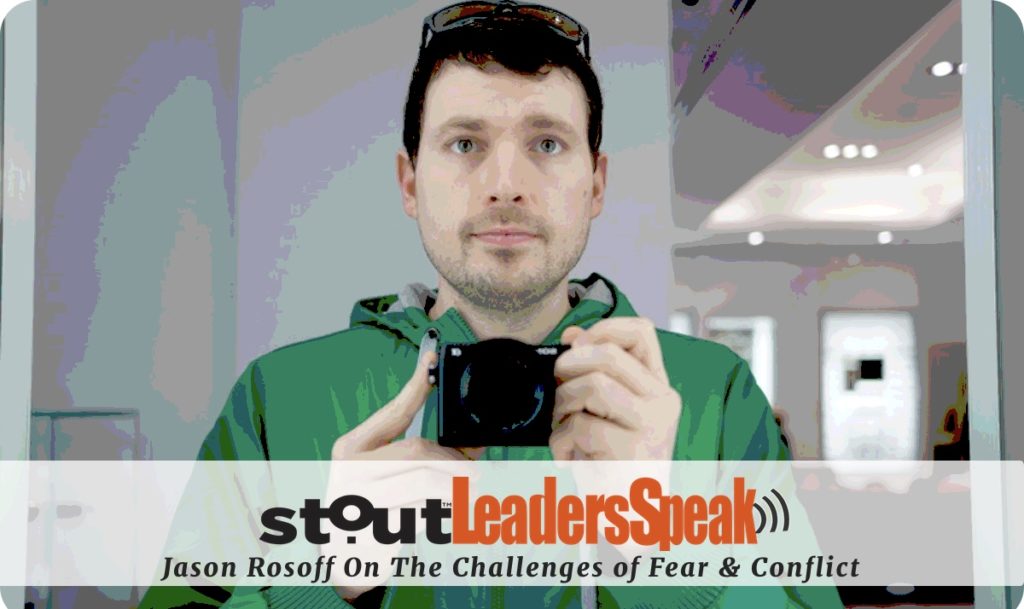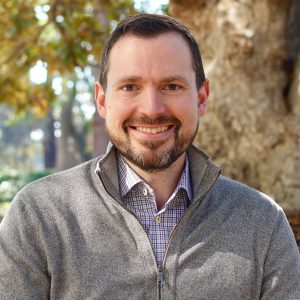
Leaders Speak: Jason Rosoff On The Challenges of Fear & Conflict

Stout words from today’s thought leaders
Clarity, Curiosity and Consciousness
Jason Rosoff, co-founder and CEO of Radical Candor, talks to Stout about the importance of fear and the power of clarity in handling conflict.

Jason Rosoff, co-founder and CEO of Radical Candor
What have you learned about fear?
There’s so much talk about fear being a negative emotion, but fear is an important emotion. Fear is a response we developed to support our survival, to allow us to quickly and intuitively identify threats. The signal is imperfect, however. In my experience, the problem with fear arises when one reacts unconsciously to it, when we treat it like a fact instead of a signal that we should consider but could easily turn out to be noise. Ideally, we bring cognition to bear on feeling of fear before we respond. This turns out to be extremely hard to do consistently.
I’ve learned to imagine my fear as a kind of mental villain with a heart of gold. He wants me to be safe and happy, but the way he goes about trying to help stinks. So when I notice fear, I try to ask myself what it’s really trying to tell me? If it’s more than noise, I try to think through how I can honor the underlying concern in my response.
I’ve also found that verbalizing our fears is very powerful. Giving form and substance to them allows us to look at them differently, and it allows us to engage the less triggered brains of our friends, family, trusted co-workers, etc.
My mantra is be clear, and then listen and be curious.
How do you deal with conflict, in general, and what process do you go through when you initiate a topic that could be received in a negative way?
When I’m worried that something might be received or perceived negatively, I have a tendency to perseverate about it. I start imagining that catastrophe is inevitable; that this will destroy my relationship with the other person. There are two problems with this. The first is that it’s super egotistical. I’m not all-knowing or all-powerful. I can be, and often am, wrong about how someone is going to react. Second, I bring this negative energy to the conversation. This can create a sort of self-fulfilling prophecy. It starts with being unclear. I’m so afraid of the outcome that I bury the lede so deeply in the conversation that the other person has no idea what I’m talking about. This has a tendency to cause confusion and frustration for the other folks in the discussion. That confusion and frustration is frustrating and disheartening for me, and down the rabbit hole of conflict and negative emotions we go.
I’ve found that if I can quickly and clearly share my thoughts on both the why (because I care and want to help) and the what (specifically what I’ve noticed/observed) and then just shut up and listen with curiosity, I get a lot more out of even the most emotional discussions. It helps me focus on what’s happening in the moment and worry less about the future, which is great because my best chance of not contributing to a negative outcome is to take care of the present moment as best I can.
What tools, training, or experience has helped you develop your leadership skills in handling fear & conflict most?
The MBSR Course at Stanford and a multi-year mindfulness practice, that’s included lots of different kinds of meditation, breath work, yoga, and being outdoors a lot!
A few years ago, I found myself captured by fear and anxiety. A prisoner to my own thoughts. The MBSR course was transformational for me. It also worked well with how I develop new habits. It was an 8-week intensive course with a community to support the new practice. It was much easier to integrate when I had others helping hold me accountable.
This might seem like an odd way to get leadership skills, but I learned that my biggest barrier to growing as a leader was me and my relationship with my own thoughts. The MBSR course is designed to help participants gain self-knowledge through mindfulness in a kind and supportive environment. I can’t recommend it highly enough.
Want more?
Check out more Stout Leaders Speak articles for great insights into success from global thought leaders.
Photos courtesy of Radical Candor.
